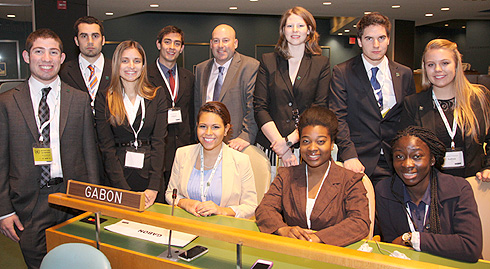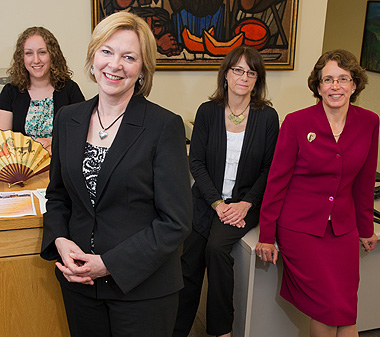Children of the World
August 21, 2012
From Maxwell Perspective...
Children of the World
Maxwell’s undergrad program in international relations serves a rising tide of students who know globalism as something more than just a slogan.

Members of Maxwell’s undergraduate Model United Nations team (left), representing the nation of Gabon, pose on the floor of the UN prior to the Model UN’s closing session.
Maxwell's Model United Nations team immersed itself in all things Gabon this spring. The group, composed of international relations undergraduate students, pored over the West African country's UN mission website, sifted through world media reports, and contacted experts on the region. They wrote papers and debated points on the country's position on such topics as disarmament, human trafficking, and agricultural productivity. And, for a week in April, 20 team members were the Republic of Gabon UN delegation - "ambassadors" as part of the National Model UN Conference that brings together university students from around the globe to represent member nations and simulate solving real-world concerns.
"They work with people from all over the world in a way they never have before," says Francine D'Amico, associate professor of international relations and Model UN faculty advisor. "They are trying to be understood, not just in terms of language but in terms of intent." Their message was heard loudly. The team won an Outstanding Delegation Award - a first for a Maxwell team.
The hard work of Model UN students exemplifies what all international relations students are facing - a world in which consensus-building means trying to understand people and their countries, not just their governments. Students know how to use the 21st-century tools of communication, but they want to be more culturally aware and better prepared for the world in their time.
So it's not surprising that more and more undergraduates are drawn to international relations. This spring, 140 students graduated with an IR major, the most ever at Maxwell.
"Students today have grown up in a networked world in which borders don't mean a lot and communication goes everywhere," says Dean James B. Steinberg, recent deputy secretary of state in the Obama administration. "They see the global connection in their own lives - in the clothes they wear, the products they buy, and the entertainment they consume. They want to understand the forces that are out there and how other people see us."
“[Students] see the global connection in their own lives. . . . They want to understand the forces that are out there and how other people see us.”
— Dean James B. Steinberg At this time of increasing global interconnectedness - and with
a seasoned expert in international affairs as the new dean -
Maxwell's undergraduate IR degree program has emerged in the past
year strongly positioned to meet the needs of its growing student
body.
Professor Mary Lovely, an economist who focuses on China in her research, is the undergraduate program's department chair, a position she assumed at the start of this academic year. Lovely is leading curriculum development and expanding student opportunities in a program that clearly is blossoming. "We're augmenting our focus on the undergraduate IR degree as one of the most popular majors in Maxwell," says Lovely, a Maxwell Professor of Teaching Excellence.
Lovely has initiated changes with the program's staff to create efficiencies and to improve student services, including increasing staffing levels and implementing an electronic-based advising scheduling system. With better advising, the staff helps students choose paths that fit the evolving focus of international relations. For example, says D'Amico, who was named Faculty Advisor of the Year by the College of Arts and Sciences in 2011, "if you're interested in international security and diplomacy, you should be studying regions where there are threats and instability. Otherwise, there's little correlation between what's happening in the world and what you're studying."
Students have responded with increasing numbers studying regional concentrations and languages, which is a requirement and a continued strength of the program. IR and Middle Eastern studies major Ivan Bakin '13 studied Arabic, which was helpful during his study abroad experience last fall in Turkey. "If you understand the way people talk to each other, it's a lot easier to understand the region and culture," Bakin says.

Members of the undergraduate IR leadership and advising team: program chair Mary Lovely (foreground) and (from left) Kristine Clay, Terrell Northrup, and Francine D’Amico. D’Amico serves, too, as advisor to the Model UN team.
Lovely is further capitalizing on trends in language and regional concentrations and is creating a faculty advisory council to help shape curriculum initiatives. For example, minors now include global political economy and global security studies. "We see ourselves as a laboratory for 21st-century interdisciplinary programs," Lovely says.
Dean Steinberg wants to see more international experiences for students, via SU Abroad and on campus. In the latter case, he foresees more international speakers and students on campus. "We want to make sure the student body is diversified, so that the students in the classroom and in extracurricular activities have that international dimension in their daily lives," he says.
Leah Moushey '12, whose area of study is Latin America and the Caribbean, expanded the breadth of her international experience studying in Chile and in the Maxwell-in-Washington program. She also participated in Model UN. Last year she was named her committee's outstanding delegate; this year, she was co-head delegate of the team. "You have to learn how to separate yourself from your prior ideas and embrace the aura of the country that you're representing," says Moushey.
Along with its outstanding delegation award, this year's Model UN team featured individual awards: Nicholas Iaquinto '14 and Zachary Jutcovich '13, best position paper in the arms trade conference; and Bakin and Kyra Murphy '14, outstanding delegates in the Security Council.
Moushey and Yiwei Wu '12, the other head delegate, say the honors were the result of rigorous preparation, including conducting classes using Model UN rules of procedure and intensive review of every member's position paper. The experience also strengthened their leadership, writing, and speaking skills, and mastery of cultural and language barriers.
Students expanded their knowledge about the political, economic, and social conditions in other countries, D'Amico says. "They are discussing the topics of the day and thinking seriously about the questions we should all be asking."
— Kathleen Haley